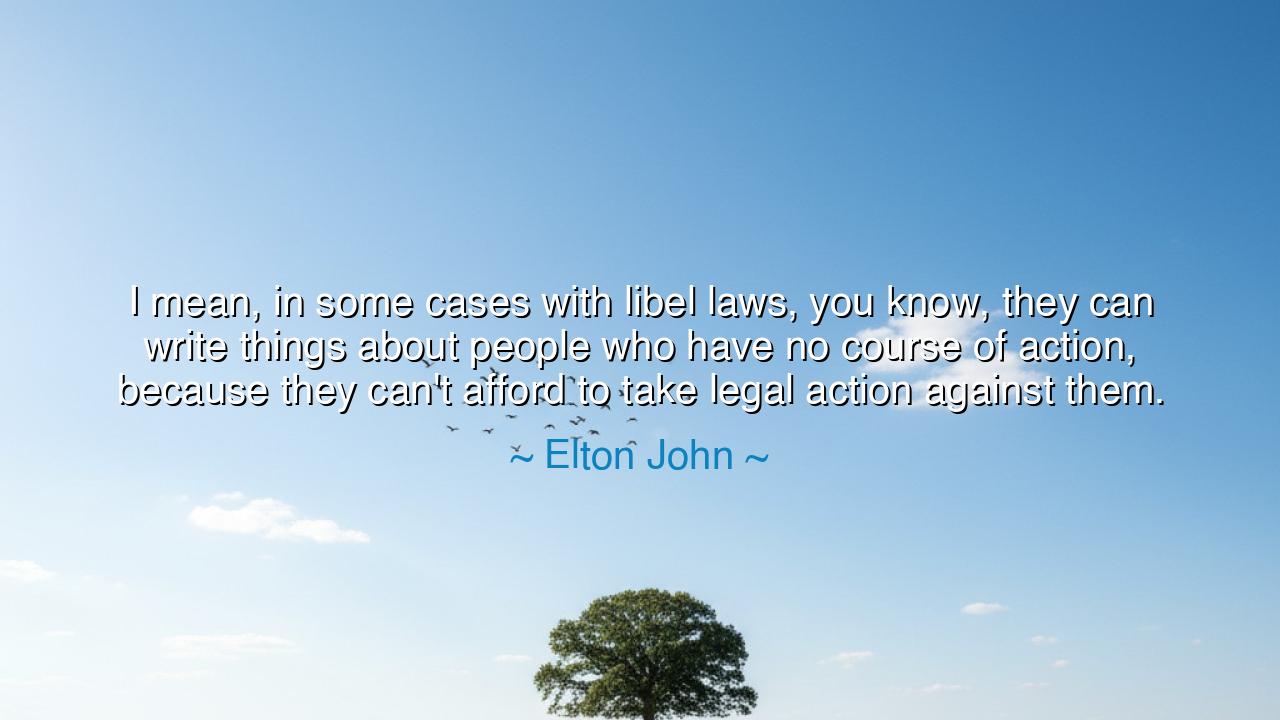
I mean, in some cases with libel laws, you know, they can write
I mean, in some cases with libel laws, you know, they can write things about people who have no course of action, because they can't afford to take legal action against them.






Hear the lament of Elton John, the troubadour whose songs stirred the hearts of millions, and who spoke of a deeper sorrow beyond the melodies: “I mean, in some cases with libel laws, you know, they can write things about people who have no course of action, because they can't afford to take legal action against them.” These words reveal the frailty of justice in a world where truth may be trampled by ink, and where power is not measured in righteousness, but in wealth. It is a cry that the shield of law, meant to protect the innocent, is too often held only by the strong.
The origin of this saying lies in Elton John’s long battle with the press. For decades, the glare of fame left him vulnerable to the cruelty of tabloids, which twisted his words, invented stories, and painted lies upon his name. Though he possessed the means to challenge them in court, he looked upon others—ordinary men and women—who suffered the same wounds but lacked the gold to buy justice. It was for them he spoke: the countless unseen, slandered without remedy, their reputations ruined with no chance of restoration.
This truth is not new. In the days of ancient Athens, the philosophers wrote of the tyranny of rumor, how words, once loosed, are arrows that cannot be recalled. Socrates himself was condemned by false accusations whispered into the ears of the people, condemned not by deeds but by slander. And in every age since, reputations have been destroyed by the sharp tongue of gossip or the poisoned quill of writers. But in our modern time, the reach of such lies is swifter and wider, carried not only by parchment but by presses, and now, by the unyielding tide of digital voices.
Elton John’s words reveal the harsh imbalance: that libel laws exist in name but fail in spirit, for justice is chained to wealth. The poor man, falsely accused, must bear the stain in silence, for he cannot pay the price of legal action. Meanwhile, the powerful may wield courts as weapons, silencing critics with threats of ruinous lawsuits. Thus, the law that should serve as a guardian becomes instead a tool of the powerful, leaving the weak defenseless.
Consider the tale of Richard Jewell, the security guard during the 1996 Atlanta Olympics. Though he saved countless lives by discovering a bomb, the press falsely cast him as the suspect. For months, he endured ridicule, suspicion, and hatred. Though later cleared, his life was scarred beyond repair. He had little wealth to challenge the newspapers, little voice to silence the storm. His story, like so many others, is a living testimony to the danger Elton John describes.
The lesson, O listener, is this: words are not harmless shadows—they are forces that can build or destroy. When falsehood spreads unchecked, it consumes reputations, livelihoods, and even lives. Justice must not be a privilege for the rich alone; it must be a mantle that covers all. Until that day, we must each bear the responsibility to speak truth, to resist the allure of gossip, and to defend the reputations of the innocent when they are unjustly attacked.
And what then shall we do in our daily lives? Let us weigh our words carefully, knowing they may outlive us. Let us refuse to repeat rumors, to share lies, or to delight in the downfall of others. Let us support systems and reforms that bring fairness, ensuring that the poor as well as the rich may seek remedy under libel laws. And let us always stand beside those who are falsely accused, offering them the solidarity that the courts may deny.
So remember the wisdom of Elton John: fame, wealth, and song cannot shield the soul from the wound of lies—but greater still is the pain of those who suffer without means to fight back. Let us live as guardians of truth, protectors of dignity, and builders of justice that is not bought with silver, but shared by all. Only then shall words become instruments of light rather than weapons of ruin.






AAdministratorAdministrator
Welcome, honored guests. Please leave a comment, we will respond soon